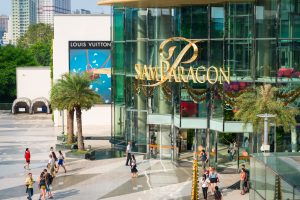Thai Prime Minister Srettha Thavisin has promised to tighten gun regulations after a teenager went on a shooting spree at a shopping center in the capital Bangkok on Tuesday.
Speaking to journalists yesterday, Srettha expressed his condolences for those killed and injured in the attack at Siam Paragon, one of Bangkok’s glitziest shopping malls, and promised to tackle the widespread availability of firearms.
“Easy access to guns is indeed a problem,” he said, BenarNews reported. “I’ve spoken with the national police chief about the proliferation of online gun sales. We are implementing stricter controls to ensure that young people cannot easily get their hands on these dangerous weapons.”
He added, “We acknowledge this issue and it’s a part of our policy now to make firearm procurement more difficult.”
A 14-year-old was arrested as the suspect in the shooting at Siam Paragon, which left two people dead – a Chinese national and a citizen of Myanmar – and injured several others. Five criminal charges, including premeditated murder and illegal possession of a firearm, have since been filed in juvenile court against the young shooter, who reportedly used a blank-firing handgun that had been modified to fire real bullets.
Police Chief Torsak Sukvimol said that the teenager, who attended a private school in Bangkok, “had a record of being treated for mental illness and gave an incoherent account of his actions after his arrest, claiming that voices told him what to do,” as The Associated Press reported.
The dead have been identified as 31-year-old Myanmar migrant worker Moe Myint, and 34-year-old Jinnan Zhao, a tourist from China. Five other people were hospitalized: one from China, one from Laos, and three Thais, several of whom are in critical condition.
The incident will add to the challenge of reviving the country’s economically pivotal tourist industry, already struggling to recover to its pre-COVID-19 numbers, particularly given that one of the victims was a Chinese tourist. Thailand is struggling especially to attract Chinese tourists, 11 million of whom visited the country in 2019, around 28 percent of the total foreign arrivals.
Srettha said the government has reached out and apologized to the Chinese ambassador for the killing of the Chinese national, according to the BenarNews report. “I also assured him that the Thai government is doing its utmost to ensure the best care for the victims,” the Thai leader said. “The ambassador seemed to understand and felt reassured.”
The shooting is the latest to cast a light on the troubling implications of Thailand’s “deep-rooted, unabashed love of guns,” as Diplomat columnist Sribala Subramanian put it in these pages in April. According to the Small Arms Survey (SAS), there are more than 10 million firearms in the hands of civilians in Thailand – the highest rate of gun ownership in Southeast Asia.
The shooting came nearly a year after Thailand’s deadliest mass shooting, which took place at a government-run childcare facility in Nong Bua Lamphu province, and took the lives of 36 people, most of them preschool children. In early 2020, a Thai soldier shot and killed 29 people and wounded 58 others before he was eventually shot and killed at Terminal 21 Mall in Nakhon Ratchasima.
While mass shootings like this are relatively rare, gun-related incidents do take place with unnerving regularity. According to the Metropolitan Police Bureau, there were 25,034 reported incidents involving licensed firearms between 2016 and 2019, and 91,376 incidents involving unlicensed ones.
Ken Mathis Lohatepanont wrote for the Thai Inquirer that while the death toll in the Siam Paragon case was thankfully low, it may be more likely to generate pressure for change. The mall is one of Asia’s best-known shopping centers, located adjacent to a busy mass transit station, and is popular both with foreign tourists and Bangkok’s middle and upper classes.
“Many Bangkok-based readers will have never have visited the Terminal 21 in Korat. Very few will have previously seen the nursery in Nong Bua Lumphu,” he wrote. “But when they read the chilling details of the Siam Paragon shooting, there will be something that feels different.”
Whether this will finally nudge Thailand toward meaningful gun control measures remains to be seen. This will require both a tightening of gun control and licensing regulations, and an effort to interdict and eliminate the large pool of unlicensed weapons circulating in Thailand. Of the 10 million-odd firearms identified by the SAS as being in the hands of Thai civilians, only 6.2 million have proper legal documentation.
As always, politics will be the deciding factor in whether the Siam Paragon shooting will end up being Thailand’s Port Arthur, or its Sandy Hook.

































